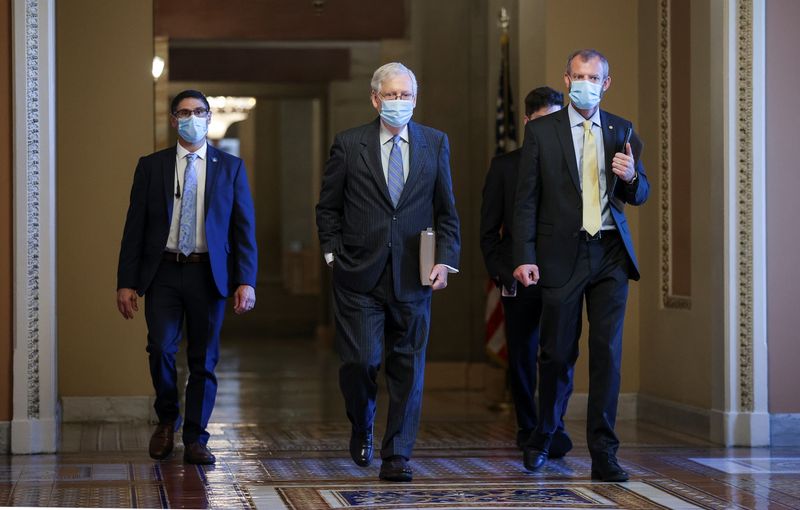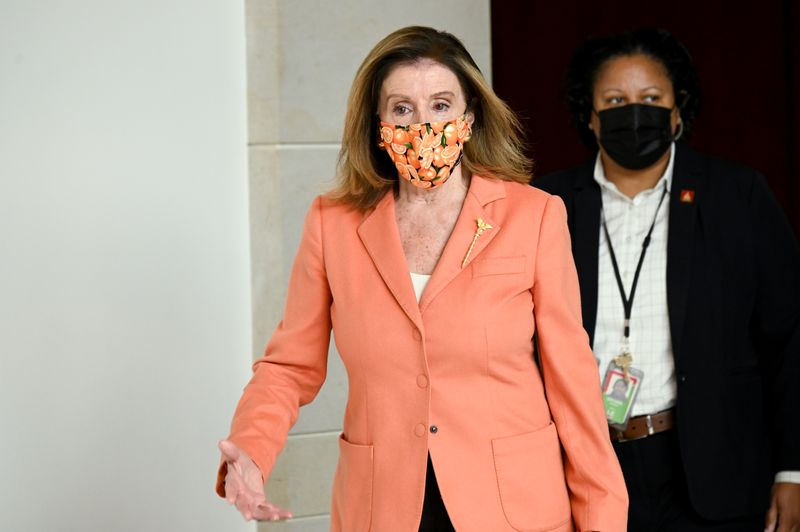By David Morgan and Susan Cornwell
WASHINGTON (Reuters) - U.S. House Speaker Nancy Pelosi on Thursday said negotiators were making progress in talks with the White House for another round of COVID-19 stimulus, but Senate Republicans remained skeptical of a possible deal costing trillions of dollars.
"I think we're not going anywhere. A lot of talk, no action," Senate Appropriations Committee Chairman Richard Shelby told reporters.
Pelosi, the top Democrat in Congress, was expected to resume negotiations at some point with Treasury Secretary Steven Mnuchin, as the two sides try to reach a deal that could be worth around $2 trillion before the Nov. 3 presidential and congressional election.
But the speaker told reporters late on Thursday afternoon that she and Mnuchin had not spoken during the day, and that she was waiting to receive some guidance from chairs of congressional committees. "We’re waiting to hear back from the committee chairs. That’s really what’s missing," Pelosi said.
Republican President Donald Trump, who has recently called for more stimulus as he trails Democratic presidential nominee Joe Biden in national opinion polls, appeared to cast doubt on a deal on Wednesday by saying he could not see any way for Democrats to agree on a stimulus package.
"Their primary focus is BAILING OUT poorly run (and high crime) Democrat cities and states," Trump wrote on Twitter.
But on Thursday morning, White House spokeswoman Alyssa Farah told Fox Business Network: "This is really the most optimistic we've felt about getting a deal."
White House economic adviser Larry Kudlow cautioned there were still "significant policy differences" with Democrats on state and local government funding and liability issues, and said these were unlikely to be resolved before Nov. 3.
After pushing through more than $3 trillion in spending meant to address the human and economic toll of a pandemic that has now killed more than 221,000 Americans https://graphics.reuters.com/world-coronavirus-tracker-and-maps, Congress since April has been unable to agree on further actions.
Senate Republicans have repeatedly rejected the sort of trillion-dollar-plus packages now under discussion, while Democrats have dismissed smaller efforts as insufficient.
Senate Majority Leader Mitch McConnell, the top Republican in Congress, does not want to bring a large bill to the Senate floor before the election, as he focuses on trying to confirm Supreme Court nominee Amy Coney Barrett.
Shelby, the appropriations committee chairman, said he had yet to see any details of the proposals that Pelosi and Mnuchin had been batting around. He said White House Chief of Staff Mark Meadows had tried to call him, but they had not connected, and Meadows had been in touch with some of his staff.
"It's about three or four minutes to midnight on the clock here. I don't see much doing. It could always be a miracle, but not very many around here," he said.
Pelosi said the two sides were narrowing differences on how to attack the pandemic and on aid to state and local governments, which has been a major hurdle.
She said talks were also focused on aid to schools and on tax credits to help lower-income Americans hit hard by the pandemic, which has left millions jobless.
Pelosi acknowledged an aid agreement would need Republican support: "We have to have strong bipartisanship on the legislation that we come together on. I would hope that we could have bipartisanship in the House and in the Senate."

Republican Senator Marco Rubio said he would be "very uncomfortable" with a big aid package in an interview with CNBC, but also acknowledged: "That said, I think the price of not doing something is even higher."
